“An Asshole from El Paso”: Kinky Friedman
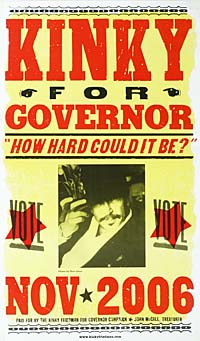 Kinky Friedman is out to save the world, in his words, “one governor at a time.” He’s out on this year’s Texas campaign trail, running for Governor. Now, if you don’t live in Texas, or aren’t a country music fan, or hate mystery novels, or don’t keep tabs on Jewish cowboys, you might be forgiven for not knowing who Kinky is. Perhaps a good introduction lies in his song:
Kinky Friedman is out to save the world, in his words, “one governor at a time.” He’s out on this year’s Texas campaign trail, running for Governor. Now, if you don’t live in Texas, or aren’t a country music fan, or hate mystery novels, or don’t keep tabs on Jewish cowboys, you might be forgiven for not knowing who Kinky is. Perhaps a good introduction lies in his song:
I’m proud to be an asshole from El Paso A place where sweet young virgins are deflowered. You walk down the street knee-deep in tacos Ta-ta-ta-tacos And the wetbacks still get twenty cents an hour.
Kinky’s been playing obnoxious country music (“Get your biscuits in the oven and your buns in the bed”) since he formed his band, The Texas Jewboys, in the early 70s. He ante-dated Borat’s Jew-pretending-to-be-an-antisemite shtick by over a decade in songs like “They Sure Don’t Make Jews Like Jesus Anymore.” He’s known as a detective novelist (Bill Clinton and George W. Bush are both big fans) and an animal rights activist. And endearingly, he makes his home at Echo Hill, a Jewish summer camp his parents started in western Texas.
Granted, running as a Jew in an overwhelmingly Christian state has its rocky moments, and Kinky hopes no one remembers what he said about the Baptists (“They don’t hold ’em under long enough”). He’s got a platform: the “dewussification” of Texas, giving gay people the rights to get married and to be “as miserable as the rest of us,” doing away with the death penalty, giving rights to illegal immigrants and getting the hell out of the way so that smart people can do their jobs. Defiant and at first blush, unserious, running with the campaign slogan, “Why the Hell Not?” his campaign reminds one of Jesse Ventura’s surprisingly successful 1998 run in Minnesota.
Running for office in a modern, mediated society is a perhaps the most exhausting, expensive, demoralizing battle a person could possibly wage. Yet year after year, in democracies worldwide, marginalized, creative, activist dreamers arise and declare their candidacies against the entrenched power structure. In recent American history, we have enjoyed the spectacle of such moderately serious candidates as Kinky Friedman and Jesse Ventura, as well as Jello Biafra’s amusing run for Mayor of San Francisco and Wavy Gravy’s “Nobody for President” campaign. We’ve also seen the sharp satire of Michael Moore’s 2000 FICUS for Congress campaign (“Because a Potted Plant can do No Harm”).
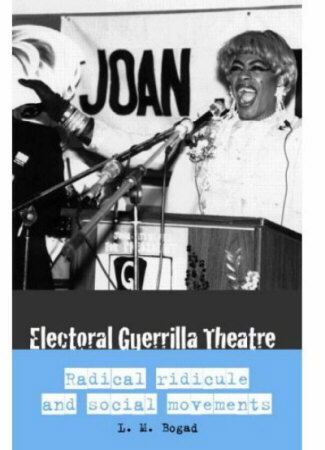
“Electoral Guerilla Theatre”: L.M. Bogad
L.M. Bogad, Assistant Professor of Theatre and Dance at UC Davis, has written a history of such campaigns in his new book, Electoral Guerilla Theatre: Radical ridicule and social movements. Coining the term in title, the text begins with an academic survey of political thinkers who hold up the stage as an important venue for radical social change. This includes Soviet exile Mikhail Bakhtin, who claimed that the “carnivalesque” brings a kind of liberation to the lower class, insofar as “it is not a spectacle seen by the people; they live in it, and everyone participates.” It also includes the German director Bertolt Brecht, who took the politics of stage theatrics one step further and dreamt of a theatre that actively alienated audiences, exposing class conflict and oppression. This notion of Verfremdungseffekt was likened to a hammer which could reshape society. Audiences were not meant to be swept away emotionally by what they saw on stage, but rather to be shocked into recognizing the truth.
Bogad has written an academic book that is clearly informed by both a passion for activism and an awareness of the fragility of social movements. Working with organizations like Billionaires for Bush, who stage ironic shows of faux upper-crust support for President Bush, and Reclaim the Streets, which is devoted to non-violent actions like illegal dance parties in the middle of public streets, his deep knowledge of the history of political theater has got to be an asset for those organizations. Overall, reading Electoral Guerilla Theatre is like taking a good course from a slightly verbose lecturer. A fascinating chunk of political history is uncovered and laced together in ways that seem useful to the reader as activist. The book is a good read, if not a toolbox, for those involved in street performance as political action, and anyone planning a campaign to promote marginalized issues or populations. It is also an interesting commentary on the theater, particularly for readers who typically don’t like their politics mixed with their drama habit. Regardless of whether or not you’ve studied theater academically, Bogad’s case studies illustrate how actions onstage, with or without the curtain, can create public awareness of inequity, and lead to concrete change. Of course sometimes, the acting falls flat, the reviews are terrible, and the audience rolls its eyes with disdain.
Despite the theatrical polemics and academic musing, however, Bogad asks readers vital questions. What happens when those on the fringes of society – bright, talented and organized – are still not taken seriously by the mainstream? Can they possibly hope to join the civic conversation about issues like housing, racism, public transportation? Will the nightly news report the views of anarchists, queers and communists? Can they join their less-articulate, better-funded and better-dressed competition on the floor of national political conventions? Experience tells us no, and that those on the far left in particular – who favor consensus-driven decision-making and prioritize local community over international politics – are doomed to being shut out of high level media conversations about society.
Despite ridicule by the mainstream, sometimes, these fringe forces rise up and use that very ridicule to get their message across. Taking a stand in intentionally ludicrous ways, they rally behind drag queens, street performers and the occasional ficus. Bogad, in his book, takes us into three fascinating histories of theatrical activists who made their mark on society through very different candidacies: in Chicago, in Sydney, and in Amsterdam.
“Rituals of legitimization for extant corrupt political structures”: Joan JettBlakk
Joan JettBlakk, the creation and “soul sister” of Chicagoan Terence Smith, is a queer black drag queen who dons a masculine look in her dresses and fishnets. No fake breasts here; she’s interested in gender confusion, not illusion.
Queer Nation/Chicago, an activist group that JettBlakk co-founded, asked Joan to run for Chicago’s 1991 mayoral race, for just the final three weeks of the campaign, in order to attract as much visibility as possible to queer life in Chicago. An absurd as idea as it was to run a drag queen against the Chicago Daley dynasty, Queer 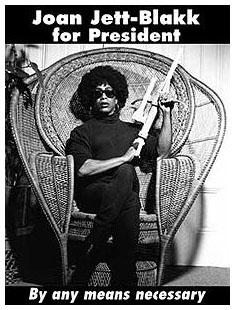 Nation bristled at the easygoing re-election farce and became determined to disrupt it however they could. JettBlakk rolled with the absurdity and embraced her freedom as a preposterous candidate to make speeches about universal healthcare, lowering taxes, the abolishment of parking tickets and the advent of gay marriage. In her own words, “Fuck Dick Daley, with my dick, daily.”
Nation bristled at the easygoing re-election farce and became determined to disrupt it however they could. JettBlakk rolled with the absurdity and embraced her freedom as a preposterous candidate to make speeches about universal healthcare, lowering taxes, the abolishment of parking tickets and the advent of gay marriage. In her own words, “Fuck Dick Daley, with my dick, daily.”
Was this queen really running for mayor? Of course not — but the visibility that her campaign brought to queer people and ideas in the local media was irresistible, and so Queer Nation decided to extend the farce towards the race for the U.S. Presidency. The purpose was not just to force mainstream journalists to address issues of queer identity, but to radically force a clash of ideas with gay community leaders less inclined to rock the boat of social norms. Most minority groups struggle between separatist and assimilationist forces. Presumably the latter camp has the larger constituency, with most folks just fighting for civil rights and decent lifestyle. Yet those on the edges often make the most noise. Queer Nation made a hell of a lot of noise, rejecting the notion that LGBT people were just like anyone else. Moderates can argue, for instance, that gay marriage is an idea whose time has come, but Queer Nation would more likely decry the institution at large, arguing that it is corrupt, heterosexist and inappropriate in a modern diverse society. Employing camp to decry such institutions and illuminate their social pain, JettBlakk used the pun “camp-pain” to describe her “campaign.” JettBlakk and Queer Nation were well aware of their place in the history of political theater and referred occasionally to related campaign.
“A lot of people say that…I became an art piece instead of a candidate, but one of the things I had in my mind the whole time I was doing it was that this was always a performance piece. It was always a prank…Jello Biafra ran for Mayor and Abbie Hoffman had some wonderful things to say about ways to fuck with the government and I really believe that running for President was a great prank to pull on everyone.” (JettBlakk, 1992.)
Drag candidacy was not about winning. It was about using the electoral process to draw attention to its own absurdity and point out the unfairness of there being only as anointed few on the floor of the Democratic National Convention? After all, should wearing a wig and Cleopatra-esque makeup mean you can’t get into Madison Square Garden? Why should those disillusioned with the two major parties have their votes wasted? As guerilla campaigns satirically imitate the format of real ones, in Bogad’s words, “they become more about the central celebrity and less about the affinity group.” For example, JettBlakk marched in St. Patrick’s Day parades, crashed formal galas to parade with other candidates, and appeared on the floor of the Democratic National Convention in her “Lick Bush in ’92” push, all the time dolled up in hot wigs and seven-inch high heels. (Bogad spills a lot of ink on these fashion details.) What was JettBlakk’s platform?
“My platforms, why tell you about them when you can see them for yourself? There they are, I walk on them every day. I’d like to see Bill (Clinton) wear these.”
====
The “Backdoor Man”: Pauline Pantsdown
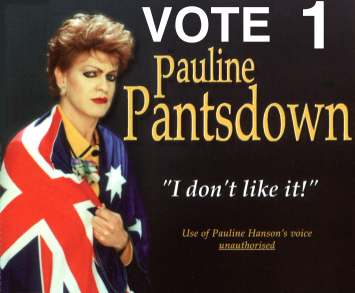 Simon Hunt is a media critic and faculty member at the University of New South Wales, Australia. He’s also a gay man and a music producer. When Pauline Hanson and her One Nation party launched a racist campaign for parliament devoted to stopping Asian immigration, denying rights to aboriginals, subsidizing medical care for whites and ceasing foreign aid, Hunt was inflamed. He did what he knew best– used some a PC to cut together a satirical song called “I’m a Backdoor Man.” The highly danceable track was a cut-up of samples of Pauline Hanson’s voice, and put back together in a way that mocked her agenda. Hunt released it under a drag pseudonym, Pauline Pantsdown.
Simon Hunt is a media critic and faculty member at the University of New South Wales, Australia. He’s also a gay man and a music producer. When Pauline Hanson and her One Nation party launched a racist campaign for parliament devoted to stopping Asian immigration, denying rights to aboriginals, subsidizing medical care for whites and ceasing foreign aid, Hunt was inflamed. He did what he knew best– used some a PC to cut together a satirical song called “I’m a Backdoor Man.” The highly danceable track was a cut-up of samples of Pauline Hanson’s voice, and put back together in a way that mocked her agenda. Hunt released it under a drag pseudonym, Pauline Pantsdown.
I’m very proud that I’m not straight I’m very proud that I’m not natural I’m a backdoor man for the Ku Klux Klan with very horrendous plans
Using “Sending You Forget-me-nots” as backup, the bouncy beat and hilarious lyrics helped it leap out of the gay underground and onto national radio, where it caused a sensation in heavy rotation. Though musically and technically inferior to today’s mash-ups, it caught on hard and fast. Pantsdown quickly became an object of major media attention, and something to which the Hanson campaign was forced to respond. Unfortunately, the Hanson campaign sued the national radio station for defamation. This had a chilling effect on radio stations, which were unwilling to take the risk of playing the song any longer.
Hunt was inspired. He officially changed his name to Pauline Pantsdown and entered the race for Parliament, declaring that there would “either be two Paulines, or none.” She followed Hanson around the campaign trail, dressed identically to her in tacky red dresses, perfectly lopsided makeup and a tousled frosted hairdo. She released two more songs mocking Hanson, one of which (“I Don’t Like it”) received enormous airplay, received two ARIA (Australian Grammy) nominations and became an activist rallying cry.
1-2-3-4-5-6-7-8, racist rubbish, racist hate, 1-2-3-4-5-6-7-8, racist rubbish, racist, feel the heat. I don’t like it, when railway lines are white, I don’t like it, when day becomes night.
The strategically important part about Pantsdown’s campaign was the way her music and theatrical seizure of media attention forced Pauline Hanson to acknowledge the critique of her campaign. Wherever she went, Pantsdown followed, and the camera crews were so amused by the evil twin that Hanson had to respond. Although Pantsdown’s third song bombed, receiving very little attention, the overall effort was a success, as Hanson was humiliated and went on to lose her campaign.
A key to Pantsdown’s success was her status as an island. She was not the front for an existing movement or organization, and she answered to no one for her actions. Her campaign was, to Bogad, Brechtian: “alienating and calling into question many assumptions about Hanson’s persona and party, rather than … [an] interactive, creative mass dynamic.”
“An extended bit of satire and provocation, not an earnest negotiation with the extant political system”: The Kabouters
But what happens when a drag candidate really wins?
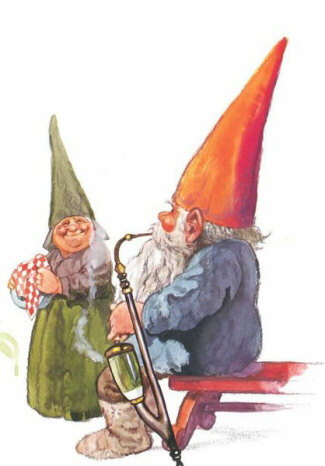 Bogad’s book takes a look at 1970s Amsterdam, where the absurdist, anarchist Kabouter Party actually won five seats on City Council. A kabouter is a gnome in Dutch folklore – think of those adorable little yard gnomes, the enchanting Gnomes and Trolls TV specials, and the books about magic still popular with gardeners and kids. The Kabouter party was a group of anarchists and artists who in the late 1960s took up the kabouter as a sweetly populist symbol of all that could go right in local politics were it not for the heartless regime.
Bogad’s book takes a look at 1970s Amsterdam, where the absurdist, anarchist Kabouter Party actually won five seats on City Council. A kabouter is a gnome in Dutch folklore – think of those adorable little yard gnomes, the enchanting Gnomes and Trolls TV specials, and the books about magic still popular with gardeners and kids. The Kabouter party was a group of anarchists and artists who in the late 1960s took up the kabouter as a sweetly populist symbol of all that could go right in local politics were it not for the heartless regime.
The Kabouters used humor and pranks to expose the brutality of Amsterdam police, the city’s dire housing shortage, and the City Council as stodgy and uncreative. Bogad goes into fascinating detail about some of these pranks, which have so obviously inspired the street performers and activists of today’s New York, San Francisco, Berlin and London that it’s incredible so few people know their history:
Operation Wandering Branch was an ongoing Kabouter action in which Kabouters ripped up street pavements and planted trees in the middle of urban spaces…This led to the police arresting the nonviolent activists and their illegal trees. Naturally the police looked a bit silly ripping up the trees and taking them away in police wagons, and attention was called to the lack of green spaces in the city…the Kabouters highlighted a serious urban political issue through provocative and humorous action rather than speechifying.
These were serious pranksters, and sooner or later they realized that a natural escalation of their politics and their theatrical style entailed actually running for city office. Astonishingly, the Kabouters and their farcical Orange Free State platform (predicated on “Sweetness, flowers and understanding”) won 11% of votes cast in the Amsterdam City Council elections, making them the fourth largest party and entitling them to five seats on the Council. They were bigger than the Socialists, Leftists, Far Rightists, and dead even with the Catholic party. Pixie Power overtook voters, and the Kabouters found themselves with a conundrum: who would actually serve, and how?
Five activists took up the call to power gleefully, reading folktales about homelessness into the public record, smoking hash in session and using the roll call to condemn the corrupt Indonesian dictator Suharto. They masterfully used the formality of the status quo to call attention to housing shortages, drug legalization, racism and poverty. Working in accordance to the anarchist ethic, “nobody can represent someone else, they decided that power would rotate every year, so that no one kabouter would become too power-drunk or unresponsive to the movement at large.
Unfortunately, despite all the right precautions, the movement ultimately collapsed. To the chagrin of the gnomes-on-the-street, the council members actually took themselves seriously. After all, how much counterculture can you retain when you’ve got power? A schism occurred between what Bogad terms the “strategic anarchists” (cautious, intellectual organizers) and the “ludic strategists” (absurdist orchestrators of street theatrics.) Was civic power a way to promote anarchism, or was this an opportunity to build another political party (albeit a funnier one)? Bogad again:
Symbols and symbolic action are multivalent and open to active interpretation, leading to conflict not only between the “straights” and the “hip,” but among diverse hipsters as well. The Orange Free State was an ironic construction… its members accomplished a great deal with few resources and their enormous creative energy. But as some Kabouters began to take [it] as a serious player in the electoral sphere, they became ripe for attack from their colleagues who still saw it solely as a clever, anarchist, anti-state joke…When Kabouters started denouncing each other, their human identity was revealed, the ludic, fantastic symbol-structure was undermined, and the activist rank-and-file left the fairy tale forests for the more prosaic, tangible grassroots.
Significantly for the activist reader, Bogad leaves us with a hard look at how satire, “like any other tactic, can get old and boring with repeated use.” While we probably shouldn’t expect to find far right politicians getting into drag to humiliate their opponents, we can’t bet on the left owning parody either. Sooner of later, the press tires of pranks, and so does the public. Additionally, Bogad warns that pushing pranks too far into the mainstream can alienate the grassroots that launch movements.
The more involved that the Kabouters got in City Council, and the more they pushed their agendas onto the national stage, the more isolated average gnomes on the street felt. They lost interest in the movement and it became harder to find activists willing to serve in official capacity. The movement splintered into smaller groups of civic activists. The lasting good news was that these activists had tools and experiences that made their projects more effective. As a result, the Amsterdam City Council, to this day, works differently because of some of the provocative actions that Kabouters took from their seats.
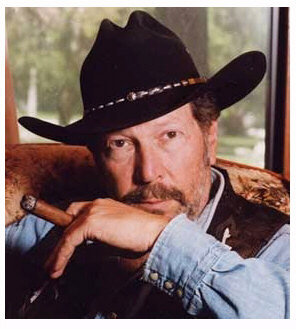
Elections are a Joke
Do those engage in electoral guerilla theater really have action plans for changing society? After reading Bogad’s book, you would perhaps conclude no. The three profiled candidates certainly had sharp critiques of the status quo, and they certainly knew where the points of pain were to be found, yet when given actual opportunities to lead, these movements collapsed (as would a ficus, no doubt, should it actually win the American presidency.) Pauline Pantsdown’s campaign arguably brought the greatest return on investment of the three, precisely because her goals were narrow and explicit – to expose Hanson as a racist and ruin her chances for office. Perhaps electoral guerilla theater is best used as a subversive sort of counter-PR tool, and best exercised by professional media hackers like Simon Hunt.
Yet the underlying message of electoral satire is more subversive than that: that elections themselves are a form of performance, and that the real political issues of the day are unlikely to be addressed in sound-bites and focus-group-tested advertisements. As Joan JettBlakk said, “Elections are a joke. We’re making this one a good joke.”
So what can we expect from our Kinky Friedman? Sure, he’s a mensch with a terrific stage presence and a knack for suspenseful prose but can he win the governorship of Texas? His performance to date signifies his potential to make an impact, if not a majority, at the ballot box. It remains to be seen, however, whether the carnival that he’s running actually galvanizes the disenfranchised, and alienates voters in just the right way to inspire them to change. What’s certain in the meantime is that he’s got some damned nice T-shirts for sale, and a great radio promo by Willie Nelson. Plus Texas would be sorry to see him leave for Arizona in the event of a crushing loss – he’s entertaining as hell.








you can always count on Universal Studios when you want some great action.,
I adore foregathering useful info, this post has got me even more info! .